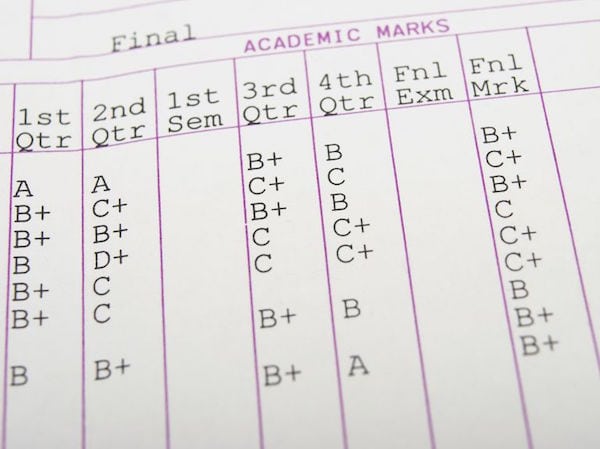What’s Considered a Good College GPA?
Find your degree

Worried about your college GPA or having a good enough high school GPA to get into college?
Transitioning from high school to college brings a lot of changes with it and one of the biggest ones is the grading system. Most high schools use a percentage point system and have classes that allow a student to rise above 100% or the coveted 4.0 spot; in college, things are presented in a much more black and white way, which you can learn more about below. Your GPA is a way for colleges and universities to gauge how you’re doing academically. Your GPA is going to play a huge role in the college you get accepted to in some cases, and once you’re at that level, it opens the doors of honors societies, graduate programs, and more. Your GPA should be something you never stop focusing on because a good one is going to be indicative of how hard you’re willing to work, how responsible you are, and what you’re capable of. It is something that graduate programs, other institutions of higher education, and potential employers want to see. There are even some surprise benefits to having a good college GPA in some cases. A bad college GPA, on the other hand, can spell disaster for you, putting you on academic probation, it can get you kicked out of school, and it can drastically reduce the opportunities that are available to you. The good news is that it is almost never too late to pull your GPA up and get on top of it!
In this guide, you can learn about what your GPA means, why it is important, how to maintain a good GPA, and how to calculate your GPA right now. Because maintaining a good GPA is integral to your success in college, we’ve tried to put together the most comprehensive guide to your GPA out there and clear up any confusion while giving you pointers on how to keep those numbers up.

What Does GPA Mean?
GPA is the abbreviation for Grade Point Average. The GPA scale is the standard method of grading in the American education system. It is always important, but it takes on an entirely new role at the college level. Scores can be as low as 0.0 and as high as 4.0, and everything in between. Each number is attached to a letter grade, usually, A through F like it has always been. Collegeboard.org is a website owned by The College Board, which is a nonprofit that has been empowering students through the transition from high school to college for over 100 years. You may have even encountered some of their materials when you were in high school! They have put together a list of how many points each letter grade is worth on the college GPA scale for you to have a better understanding of where these numbers are coming from. The list is as follows:
- A+: 4.0
- A: 4.0
- A-: 3.7
- B+: 3.33
- B: 3.0
- B-: 2.7
- C+: 2.3
- C: 2.0
- C-: 1.7
- D+: 1.33
- D: 1.0
- F: 0.0
Based on the percentage that corresponds to your letter grade, this scale could vary slightly, but not by very much. In order to calculate your GPA, the total amount of grade points earned is divided by the total amount of credit hours attempted. For example, if you took 12 credit hours in one year, and you earned 2 A’s, a B, and a C, your GPA would be 3.25. The average college GPA across America today is 3.15, which represents a solid B average. In order to receive the perfect 4.0 GPA, you must receive straight A’s. Generally speaking, the minimum college GPA you can receive and graduate is usually about 2.0.

Why Does My College GPA Matter?
Your GPA is so much more than an arbitrary number! It is hard to treat it like it is very important when you’re not sure why hopefully, this can help you to keep it at the forefront of your focus. Your GPA is always important, but in some majors, it does carry more weight with it. It is mandatory for students to maintain a GPA above 2.0 or they run the risk of being placed on academic probation, and if it dips lower, you can see yourself being kicked out of school. Getting kicked out because of a low GPA is going to take away everything you have worked for up to that point and is a waste of tuition, so while college can be stressful at times, it is imperative that you stay on top of your studies and communicate with your professors as much as possible. Some majors where your GPA may need to be higher include education, pre-med, and pre-law. Those fields typically require you to have a B average in all major-specific courses or could require you to maintain a GPA of 3.0 or higher, which is an overall B average. You can retake classes to get your GPA up to a more desirable level but you will have to pay the tuition and sometimes a fee to repeat any classes.
Maintaining a higher GPA will help you to get into graduate-level programs as well. Some of the graduate programs available are incredibly competitive and require a GPA as high as 4.0; typically, they require at least a 3.0. The more competitive the program is that you’re looking at, the harder you’ll need to work to prove that you deserve to be there (because you do!).
Honors Societies and the Dean’s List are other perks that call for a higher GPA. They are both very honorable and demonstrate how dedicated you are as a student. This is attractive to graduate programs and potential employers alike. Your future success is riding on how well you perform in college because as more people are getting better grades (the average GPA in 1950 was just 2.15!), more programs are becoming increasingly competitive so that they can select the best of the best. In addition, employers want someone who is dedicated, pays attention to detail, and someone that they can count on to get the work done. Being part of an honor society and graduating Cum Laude are highly indicative of those traits that employers want to see. Simply put, the better your GPA looks, the better your resume looks. It is worth putting that extra work in if it comes down to it.
There are also sports to consider. Most of the students that are reading this guide are probably interested in a distance education program; however, it is important to understand every aspect of your GPA. Over 450,000 people plan to play sports at the NCAA level each year and just like high school, you will be required to maintain a GPA above a certain point to make sure that you remain eligible to participate. Generally speaking, any student on academic probation isn’t going to be eligible to play any sports.
But, we’re not here to stress you out! Getting into college, even just choosing to go to college, is an awesome accomplishment! You have all of the tools you need to make sure that you can do more than just stay afloat, you can excel! If you’re feeling a little nervous, here are some tips to make sure you can keep that GPA up.

How Can I Have a Good GPA?
Now that you know how important it is to pay attention to your GPA, you might be wondering what are some things you can do to help make sure that it is staying where you want it to be, or even growing from where it is now. A “good” GPA is going to be relative to your field, always. But, across the board, the higher it is, the better it is going to look to everyone who is watching. The main tip that comes from college students and education experts alike is to start strong. Freshman year can be a tough time as you adjust to your independence, the new atmosphere that comes with college, and all of the new experiences that come with the freedoms you have now that you’re an adult. Starting strong despite those changes and challenges associated with them is going to lay a strong foundation for the remainder of your time in college. GPAs are cumulative, starting with your very first class your freshman year and counting every credit hour you attempt right up through to the time you graduate. Any classes that you withdraw from won’t be counted and any classes you retake will reflect the grade you got on your second time around.
Be selective with your courses. Not every professor is going to grade the exact same way, and that is something to explore deeper. But, there is more to it than just that. If you have an English requirement, you’ll likely have choices between a few different courses. If your options are Composition or Shakespearean Literature, for instance, and you have always been really interested in Shakespeare’s work and have a lot of experience, you may want to select the latter. If iambic pentameter makes your head hurt, Composition it is! Don’t shy away from courses that interest you or will challenge you, but remember that you want to do your best. Consider your strengths! Especially for your general education courses because they’re the foundation that the rest of your GPA will be built on over the years.
When it comes to selecting courses, you should also pay attention to your choices and make sure that you try to balance things out. It might seem very alluring to push all of the difficult courses off as long as possible because breezing through Algebra 1 feels great. But, you should look at your course load and divide things up so that you’re not taking courses that are way too easy all at once, or way too hard. If you take all of your easy classes up front, you might get bored or get into a groove where you don’t have to work as hard as you’ll need to on the tougher subjects. When you finally get there, you might be so used to skating by that you struggle to focus. Additionally, it might be equally tempting to knock out all the hardest subjects at once, but college is a new experience. You want to have time to enjoy yourself, of course! But, taking too much at once can make you feel burnt out, it can discourage you, and it can tank your GPA if you’re not careful.
The last tip to keeping your GPA in a good place is the most important and that is to never be afraid to put the work in and take advantage of the resources available to you. There might be long nights and early mornings for certain subjects and sometimes it is going to feel really difficult. It may even feel impossible, but you should remember that it is never impossible! Don’t put off studying when you know that you need to, don’t resign yourself to failing a tough test coming up so you don’t bother to try your best, and don’t forget to kick back and relax if you start to feel burnt out. There are plenty of tutoring options available for you, free study tools and groups online and through your school, a lot of the time and your professor is there to help you learn as well. Ask questions, cover all your bases, and work as hard as you can. You got this!

What Is My GPA? Use the GPA Calculator
Are you a college student right now? Maybe an aspiring college student that is interested in checking out how your GPA is looking right now? You can use this handy GPA calculator to figure it out!
